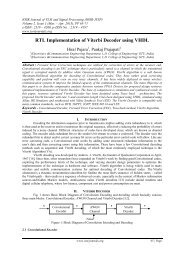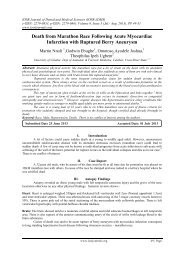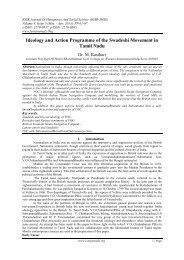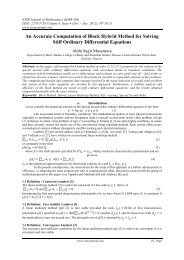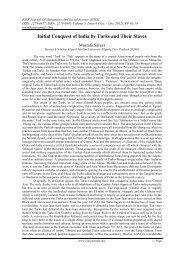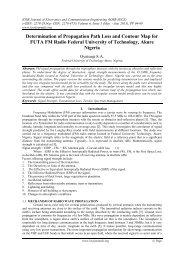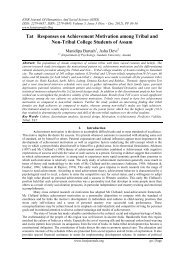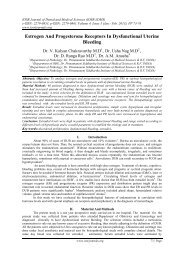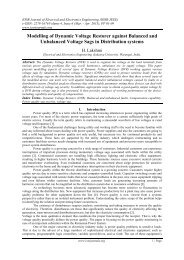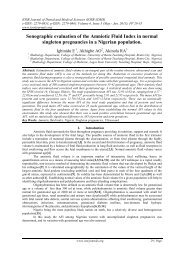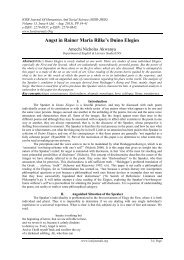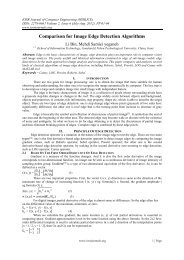Design Compatibility of Classroom Furniture in Urban and ... - IOSR
Design Compatibility of Classroom Furniture in Urban and ... - IOSR
Design Compatibility of Classroom Furniture in Urban and ... - IOSR
Create successful ePaper yourself
Turn your PDF publications into a flip-book with our unique Google optimized e-Paper software.
The Impact Of Corporate Governance And Leadership On Entrepreneurship Development In Nigeria<br />
corporate entity or enterprise receives its basic orientation <strong>and</strong> direction. The narrow view perceives corporate<br />
governance <strong>in</strong> terms <strong>of</strong> issues relat<strong>in</strong>g to shareholder protection, management control <strong>and</strong> the popular pr<strong>in</strong>cipleagency<br />
problems <strong>of</strong> economic theory.<br />
However, Oman (2001) observe that broader approach to corporate governance is the method by which<br />
suppliers <strong>of</strong> f<strong>in</strong>ance control managers <strong>in</strong> order to ensure that their capital cannot be expropriated <strong>and</strong> that they<br />
earn a return on their <strong>in</strong>vestment.<br />
There is a consensus, however that the broader view <strong>of</strong> corporate governance should be adopted <strong>in</strong> the<br />
case <strong>of</strong> bank<strong>in</strong>g <strong>in</strong>stitutions because <strong>of</strong> the peculiar contractual form <strong>of</strong> bank<strong>in</strong>g which dem<strong>and</strong>s that corporate<br />
governance mechanisms for banks should encapsulate depositors as well as shareholders. Oyejide <strong>and</strong> Soyibo<br />
(2001) jo<strong>in</strong>ed the consensus by depositor, by argu<strong>in</strong>g that the special nature <strong>of</strong> bank<strong>in</strong>g requires not only a<br />
broader view <strong>of</strong> corporate governance, but also government <strong>in</strong>tervention <strong>in</strong> order to restra<strong>in</strong> the behaviour <strong>of</strong><br />
bank management. They further argued that, the unique nature <strong>of</strong> the bank<strong>in</strong>g firm, whether <strong>in</strong> the developed or<br />
develop<strong>in</strong>g world requires that a broad view <strong>of</strong> corporate governance, which encapsulates both shareholders <strong>and</strong><br />
depositors, be adopted for banks. They posit that, <strong>in</strong> particular, the nature <strong>of</strong> the bank<strong>in</strong>g firm is such that<br />
regulation is necessary to protect depositors as well as the overall f<strong>in</strong>ancial system.<br />
Accord<strong>in</strong>g to Soyibo, Olayiwola, & Alay<strong>and</strong>e, (2002), <strong>in</strong> the Nigerian f<strong>in</strong>ancial sector, poor corporate<br />
governance is identified as one <strong>of</strong> the major factor s<strong>in</strong> virtually all known <strong>in</strong>stances <strong>of</strong> a f<strong>in</strong>ancial <strong>in</strong>stitution's<br />
distress <strong>in</strong> the country. Thereafter the consolidation <strong>of</strong> the bank<strong>in</strong>g <strong>in</strong>dustry, however, necessitated a review <strong>of</strong><br />
the exist<strong>in</strong>g code <strong>of</strong> the Nigerian banks. The 2006 Code <strong>of</strong> Corporate Governance for Banks <strong>in</strong> Nigeria Post<br />
Consolidation was developed to compliment other policies <strong>and</strong> enhance their effectiveness for the Nigerian<br />
bank<strong>in</strong>g <strong>in</strong>dustry. Compliance with the provisions <strong>of</strong> this code is m<strong>and</strong>atory. However the recent Global<br />
F<strong>in</strong>ancial Crisis, Asia Crisis <strong>and</strong> the bitter experience <strong>of</strong> banks distress <strong>and</strong> failure, suggest that Nigeria needs to<br />
take stock <strong>of</strong> its corporate governance.<br />
Oyejide <strong>and</strong> Soyibo (2001) def<strong>in</strong>e corporate governance as the relationship <strong>of</strong> the enterprise to<br />
shareholders or <strong>in</strong> the wider sense as the relationship <strong>of</strong> the enterprise to society as a whole.<br />
Ogundele, (2007) def<strong>in</strong>ed corporate governance as the system that relates to the patterns <strong>of</strong><br />
arrangement with<strong>in</strong> private organizations or companies, which vested <strong>in</strong>dividuals or groups with power <strong>and</strong><br />
authority to control the affairs <strong>of</strong> an enterprise.<br />
Dess <strong>and</strong> Lumpk<strong>in</strong> (2002) def<strong>in</strong>e corporate government as the relationship among various participants<br />
<strong>in</strong> determ<strong>in</strong><strong>in</strong>g the direction <strong>and</strong> performance <strong>of</strong> corporations. They noted that, the primary participants are –<br />
shareholders, the manag<strong>in</strong>g headed by Chief Executive Office (CEO), <strong>and</strong> the board <strong>of</strong> directors.<br />
Confederation <strong>of</strong> India Industry (CII) (1997) states that corporate governance deals with laws, procedures,<br />
practices, <strong>and</strong> implicit rules <strong>and</strong> determ<strong>in</strong>e a company‟s ability to take managerial decisions vis-à-vis its<br />
claimant- particularly, its shareholders, creditors, the state <strong>and</strong> employees.<br />
They suggested that corporate governance be made more effective through shareholders activism,<br />
effective managerial rewards <strong>and</strong> <strong>in</strong>centive <strong>and</strong> committed <strong>and</strong> <strong>in</strong>volved board <strong>of</strong> directors.<br />
The concept <strong>of</strong> entrepreneur has a wide range <strong>of</strong> mean<strong>in</strong>gs. Entrepreneur is an <strong>in</strong>dividual who successfully<br />
th<strong>in</strong>ks or conceives <strong>of</strong> a new bus<strong>in</strong>ess concern, organizes or <strong>in</strong>itiate actions to start it, <strong>and</strong> manages it through its<br />
<strong>in</strong>itial problems <strong>and</strong> struggles for survival. (Ogundele, 2000 <strong>and</strong> 2005).<br />
Therefore, small <strong>and</strong> medium scale enterprises (entrepreneurs) <strong>in</strong> Nigeria need a good corporate<br />
governance to control <strong>and</strong> direct their day to day activities. Amit, Glosten <strong>and</strong> Muller (1993) def<strong>in</strong>e<br />
entrepreneur as <strong>in</strong>dividual who <strong>in</strong>novates, identifies <strong>and</strong> creates bus<strong>in</strong>ess opportunities, assembles <strong>and</strong><br />
coord<strong>in</strong>ates new comb<strong>in</strong>ations <strong>of</strong> resources, <strong>and</strong> extract<strong>in</strong>g the most pr<strong>of</strong>it from his <strong>in</strong>novation <strong>in</strong> uncerta<strong>in</strong><br />
environment.<br />
Entrepreneurship is an aspect <strong>of</strong> the concept entrepreneur. For this reason, Ogundele (2007) describes<br />
entrepreneurship as the processes <strong>of</strong> emergence, behaviour <strong>and</strong> performance <strong>of</strong> entrepreneurs. He notes that a<br />
focus on entrepreneur is a focus on the <strong>in</strong>dividual organization created while entrepreneurship is a focus on the<br />
processes <strong>in</strong>volved <strong>in</strong> the <strong>in</strong>itiation <strong>of</strong> a new organization, the behaviour <strong>of</strong> such organization <strong>and</strong> its<br />
performance <strong>in</strong> terms <strong>of</strong> pr<strong>of</strong>it made. Entrepreneurship therefore refers to the activities <strong>of</strong> <strong>in</strong>dividual<br />
entrepreneurs <strong>and</strong> the entrepreneurial groups at all the three phrases <strong>of</strong> emergence, behaviour <strong>and</strong> performance<br />
<strong>of</strong> entrepreneurs.<br />
Hill <strong>and</strong> McGowan (1999) sees entrepreneurship as a process which <strong>in</strong>volves the effort <strong>of</strong> an <strong>in</strong>dividual<br />
(or <strong>in</strong>dividuals) <strong>in</strong> identify<strong>in</strong>g viable bus<strong>in</strong>ess opportunities <strong>in</strong> an environment, obta<strong>in</strong><strong>in</strong>g <strong>and</strong> manag<strong>in</strong>g the<br />
resources needed to exploit those opportunities.<br />
Schumpeter (1934) an Australian economist found that the s<strong>in</strong>gle function which constitute<br />
entrepreneurship concept is <strong>in</strong>novation such as new products, new production method, new market <strong>and</strong> new<br />
forms <strong>of</strong> organization. Wealth is created when such <strong>in</strong>novation 'results <strong>in</strong> new dem<strong>and</strong>. However, <strong>in</strong> today's<br />
knowledge driven world, <strong>in</strong>dividual entrepreneurial skills have ceased to be the important determ<strong>in</strong>ants <strong>of</strong><br />
bus<strong>in</strong>ess success but, organizational characteristics have assumed for greater importance on collaborative effort<br />
www.iosrjournals.org<br />
49 | Page



